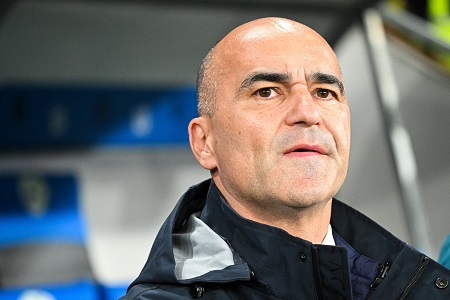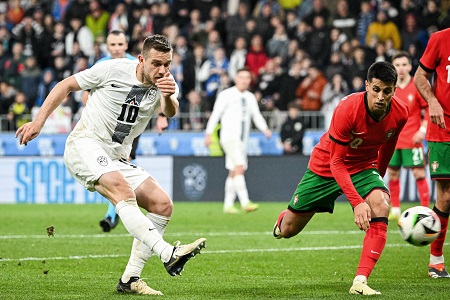 Portugal and Slovenia have only encountered each other once throughout their football history, with Slovenia claiming a 2-0 friendly win against the Seleção in March of this year.
Portugal and Slovenia have only encountered each other once throughout their football history, with Slovenia claiming a 2-0 friendly win against the Seleção in March of this year.
The stakes are much higher on Monday, as the sides contest a European Championships knockout clash. We take a look at what Roberto Martínez’s team can expect in Frankfurt against their unbeaten opponents.
Slovenia take their place in the last 16 having emerged from Group C, which many observers deemed the least entertaining section of the group phase. England, much maligned by their own supporters as well as most neutrals, stumbled their way to top place in the group and were followed by runners-up Denmark, with Slovenia qualifying as one of the best 3rd-place sides on a tally of three points, having drawn all their games.
Under the guidance of Matjaž Kek, their vastly experienced and deeply respected manager, Slovenia secured passage to the next stage with a goalless draw against England. Their matches against Denmark and Serbia had each produced 1-1 draws, extending their unbeaten run in all competitions to a Slovenian all-time record of nine matches.
How they play
Although Slovenia’s victory over Portugal in March, which saw them end Roberto Martínez’s 11-match winning streak, may feel an insightful reference point, it is perhaps not the best focus for analysis ahead of Monday’s meeting. Martínez fielded an experimental side, missing the likes of Rúben Dias, Bernardo Silva and Bruno Fernandes. It was also a friendly match, played in the Slovenian capital Ljubljana.
The details of the match and the extent to which Portugal struggled to break down their opponents are not insignificant, but Slovenia’s form in competitive matches and the current tournament feels more relevant. That said, many in Slovenia believe the victory over Portugal, despite being a non-competitive outing, gave the squad a major boost ahead of this summer’s tournament in Germany.
Manager Matjaž Kek led his team into the tournament with a wealth of experience, having overseen well over 100 international matches across two stints in charge. A defender with a solid playing career in his homeland and in Austria, Kek has enjoyed success as a manager both in Slovenian and Croatian football.
Whilst Roberto Martínez has further grown his reputation as a flexible and unpredictable coach, Kek’s Slovenia represent a picture of consistency. The 62-year-old boss has named an unchanged line-up in all three group-stage matches, of which 9 of the 11 featured in March’s friendly victory at Stožice Stadium. A simplicity Kek summed up earlier this week, saying: “the boys don’t need any meetings, today we agreed in three, four minutes.”
The gameplan is clear and almost robotic in its execution. Kek deploys a very traditional 4-4-2 system, with a strong emphasis on wide play and swift service to two tall specialised centre-forwards. The full-backs join up with the attack on the overlap and there is a natural instinct to supply star man and emerging star of European football – RB Leipzig’s Bejamin Šeško, who is unlucky to be without a goal in the tournament having struck the woodwork more than once.
Slovenia are certainly not ball-hoggers, ceding possession to most opponents. Indeed, in the clash with England, during which the players were aware a draw would likely secure qualification, Kek’s side ended the encounter with just 27% of the ball. Against Serbia they recorded 39% and their opener against Denmark saw 32% possession. Should teams open the rearguard, they are confronted by Jan Oblak, star goalkeeper and arguably Slovenia’s best player since the mercurial Zlatko Zahovič, who found fame in Portugal with Vitória Guimarães, Porto and Benfica around the turn of the century. Oblak was particularly outstanding against Serbia.
Portugal have encountered a defensive-minded adversary with a physical two-man strike force in their tournament opener against Czechia. However, Slovenia play with more intensity – they hassle and harry their opponents. Against England they started the match with a dominant and aggressive high press to make their stamp on proceedings by successfully forcing errors, before gradually dropping off into a more reactive approach.
There is no confusion or surprise for Kek’s players with the gameplan and the Slovenian line-up are acutely familiar with their roles. Opposition players in the Slovenia half are subjected to tight marking and pressure, with the objective of disrupting patterns and fluency. Going forward, the overlap from full-back and the supply of crosses or direct long balls into the strike due of Šeško and former Sporting man Andraz Sporar is simple but forceful, as are the runs from deep to join up with attacks. Slovenia’s two goals have been scored by their two full-backs in open play; what they do, be it defending or attacking, they do with intensity and purpose.
 Potential weaknesses? Tempo the key
Potential weaknesses? Tempo the key
Slovenia succeeded in shutting England out, but they were assisted by the lack of tempo and invention of Gareth Southgate’s side, who appeared happy to adopt a risk-adverse approach to secure top spot in the group. England were ponderous, sloppy in their passing and often took too many touches, allowing the Slovenian defence to force mistakes and easily regroup whenever they lost possession.
When England did occasionally move the ball faster with fewer touches to break the tenacious press, space became much easier to access. In his short time on the field, substitute Cole Palmer caused enough problems to leave England fans feeling a more creative and adventurous approach would have yielded better results.
If Portugal trust their ability to play with one or two touches, utilising their technical qualities and intelligence of movement to draw their enthusiastic opponents out of position, they should cause more problems. Slovenia attack down the flanks and the full-backs are encouraged to support play, meaning the space in behind with quick transitions or bright movement could be a weakness. There is no doubt when the ball is moved quickly and incisively, Slovenia look a far more vulnerable prospect as their instinct to chase the ball is exploited.
Kek will be forced into his first change of the tournament, with impressive left-back Erik Janza, who was the star man and goalscorer against Denmark, suspended thanks to two yellow cards. Jure Balkovec of Turkish side Alanyaspor is the natural replacement, but Balkovec is not a certain starter for his club and his potential nerves at coming into a previously unchanged side make him a target at left-back.
We should prepare for the possibility of an aggressive start from Slovenia, similar to that shown against England, where they initially pushed both centre-forwards and both wide men up to pin the English back four. But as the game settles down, the emphasis will surely turn to hassling Portugal in the Slovenian half and forcing panic with tenacious pressure on the Seleção’s creative players.
Quick use of the ball and swift passes and switches of play in behind the full-backs feel an obvious avenue for the Seleção. If the channels prove an area in which Slovenia leave space, Portugal’s depth of options from the bench and how and when they are deployed later in the contest could be decisive. Rafael Leão has disappointed so far, but perhaps his suitability to the task at hand could earn further trust from Martínez.
What they are saying:
Matjaž Kek (manager)
“The match in March? These are two completely different matches. That game was important because it created a positive atmosphere. But we would be foolish to think ‘we’ve already beaten them’. If anyone lives off that 2-0, we will be in big trouble. Everyone knows who the favourite is, but on our side are the challenge, the motivation, and the great satisfaction that we are not yet on vacation.
“I have always felt that the boys knew something was going to happen [in this tournament] and they believed so much that they were not shocked, like ‘now we’re in the next round. Today they act like boys who know what it’s all about, what their mission is.
“We are a team with a small base but we must be aware of our quality. We shouldn’t make a circus out of qualifying. But on the other hand, we also shouldn’t make a tragedy out of failures. This line is always thin in Slovenian football. But the maturity and simplicity of the players constantly surprises me in a positive way. Because I also prefer simplicity.
“It’s clear that we are now on the big stage. Along with the Georgians, we are probably considered ‘exotic’ in this company. But that suits me. There was a lot of truth yesterday when I said I wasn’t sure if I would want Romania. I prefer the challenge. I don’t want to be a copy of the Croats, Portuguese, Germans, but I want us to go our own way. When we make a mistake, we make it ourselves and take responsibility for it.”
By @SeanGillen9

